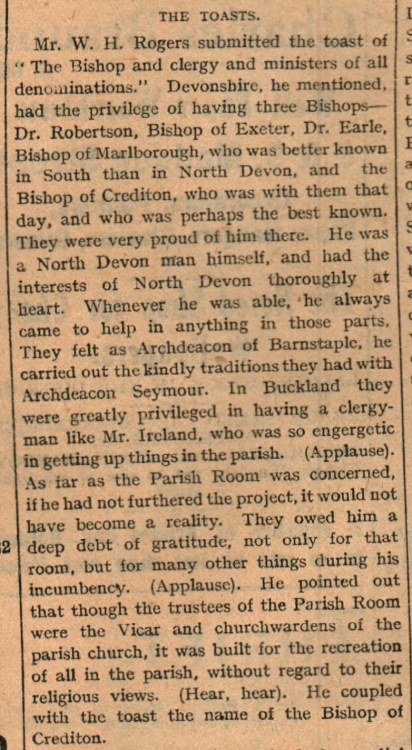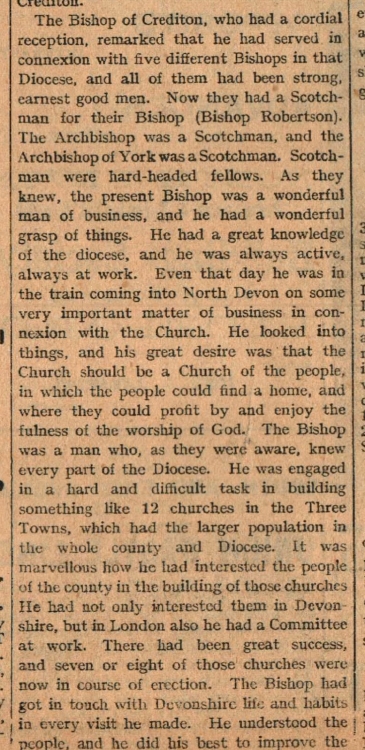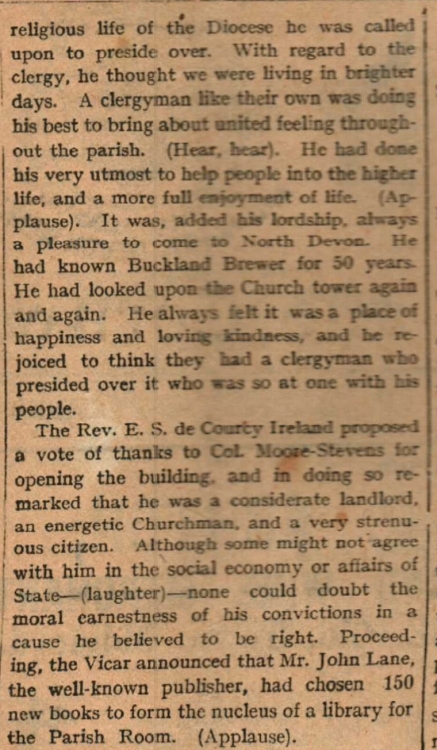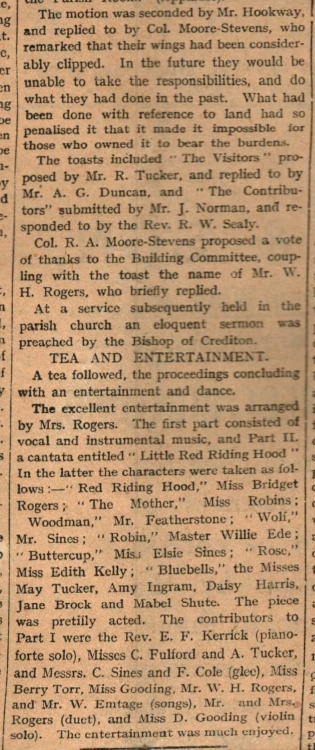Visit of the Bishop of Crediton
New room for the recreation of all.

Even the heavy rain which fell during the morning could not detract from the interest taken on Wednesday last in the opening of the fine new Parish Room which has just been erected at Buckland Brewer, and the day was a red-letter one in the district, which for miles around was largely represented in the proceedings.
The Building Committee, which consisted of Mr W H Rogers and Miss Rogers, of Orleigh Court, the Vicar of Buckland Brewer (the Rev E S de Courcy Ireland), Messrs R and J Tucker, and R Squire, is to be congratulated upon the addition to the parish of so handsome and substantial a structure. The front is of knobbed stone, with heavy cement plinth, the new room being 40ft long by 21ft wide, and 16ft in height. It is heated with an improved tortoise stove, attached is a boiler house, where water can be boiled for providing teas, etc. when occasion demands. When the new building has been furnished, the total cost will be about £260. Towards this £220 has been subscribed, leaving about £40 still to be obtained. The building, which will accommodate about 200 persons, was erected by Messrs Featherstone Bros. of Buckland Brewer, from plans and specifications prepared by Messrs Groves-Cooper, Stapledon and Powell, of Bideeford.
Col R A Moore-Stevens, JP, of Winscott, presided at a largely attended luncheon in the New Parish Room, being supported, among others, by the Bishop of Crediton (Dr Trefusis), the Rev R W Sealy (Vicar of Abbotsham and Rural Dean), the Vicar of Buckland Brewer (the Rev E S de Courcy Ireland), Messrs W H Rogers, and C R H Bruce. Mr Charles Hookway and Mr Robert Tucker (churchwardens), Mrs Ireland, Mrs and Miss Rogers, Miss Best, Mr A D Duncan, JP, (Bideford), Mr J Norman and others.
Prayer by the Bishop of Crediton was followed by Col Moore-Stevens formally declaring the building open. It gave him great pleasure to come to the parish of Buckland Brewer, because he was intimately connected with it, and received considerable source of his livelihood from the parish. For those reasons it was, of course, he took so much interest in the parish, and also because of the inhabitants being good neighbours. At one time he had property in the village but in consequence of circumstances over which one had not always control, he had to dispose of some of it. But that did not prevent him taking an interest in all that concerned the village. He was extremely glad to find that by the liberality of many people and the exertions of others, that toom had risen from the foundations, and he hoped it would be a room of great good and power in the parish. He urged them to inform themselves on the best writings. He hoped that room from its inception would be a token of good for all.
Mr W H Rogers submitted the toast of ‘The Bishop and clergy and ministers of all denominations.” Devonshire, he mentioned, had the privilege of having three Bishops – Dr Robertson, Bishop of Exeter, Dr Earle, Bishop of Marlborough, who was better known in South than in North Devon, and the Bishop of Crediton, who was with them that day, and who was perhaps the best known. They were very proud of him there. He was a North Devon man himself, and head the interests of North Devon thoroughly at heart. Whenever he was able, he always came to help in anything in those parts. They felt as Archdeacon of Barnstaple, he carried out the kindly traditions they had with Archdeacon Seymour. In Buckland they were greatly privileged in having a clergyman like Mr Ireland, who was so energetic in getting up things in the parish. As far as the Parish Room was concerned, if he had not furthered the project, it would not have become a reality. They owed him a deep debt of gratitude, not only for that room, but for many other things during his incumbency. He pointed out that though the trustees of the Parish Room were the Vicar and churchwardens of the parish church, it was built for the recreation of all in the parish, without regard to their religious views. He coupled with the toast the name of the Bishop of Crediton.
The Bishop of Crediton, who had a cordial reception, remarked that he had served in connexion with five different Bishops in that Diocese, and all of them had been strong, earnest good men. Now they had a Scotchman for their Bishop (Bishop Robertson). The Archbishop was a Scotchman. Scotchman were hard-headed fellows. As they knew, the present Bishop was a wonderful man of business, and he had a wonderful grasp of things. He had a great knowledge of the diocese, and he was always active, always at work. Even that day he was in the train coming into North Devon on some very important matter of business in connexion with the Church. He looked into things, and his great desire was that the Church should be a Church of the people, in which the people could find a home, and where they could profit by and enjoy the fulness of the worship of God. The Bishop was a man who, as they were aware, knew every part of the Diocese. He was engaged in a hard and difficult task in building something like 12 churches in the Three Towns, which had the larger population in the whole county and Diocese. It was marvellous how he had interested the people of the county in the building of those churches. He had not only interested them in Devonshire, but in London also he had a Committee at work. There had been great success, and seven or eight of those churches were now in course of erection. The Bishop had got in touch with the Devonshire life and habits in every visit he made. He understood the people, and he did his best to improve the religious life of the Diocese he was called upon to preside over. With regard to the clergy, he thought we were living in brighter days. A clergyman like their own was doing his best to bring about united feeling throughout the parish. He had done his very utmost to help people into the higher life, and a more full enjoyment of life. It was, added his lordship, always a pleasure to come to North Devon. He had known Buckland Brewer for 50 years. He had looked upon the Church tower again and again. He always felt it was a place of happiness and loving kindness, and he rejoiced to think they had a clergyman who presided over it who was so at one with his people.
The Rev E S de Courcy Ireland proposed a vote of thanks to Col Moore-Stevens for opening the building, and in doing so remarked that he was a considerate landlord, an energetic Churchman, and a very strenuous citizen. Although some might not agree with him in the social economy or affairs of State, none could doubt the moral earnestness of his convictions in a cause he believed to be right. Proceeding, the Vicar announced that Mr John Lane, the well known publisher, had chosen 150 new books to form the nucleus of a library for the Parish Room.
The motion was seconded by Mr Hookway, and replied to by Col Moore-Stevens, who remarked that their wings had been considerably clipped. In the future they would be unable to take the responsibilities, and do what they had done in the past. What had been done with reference to land had so penalised it that it made it impossible for those who owned it to bear the burdens.
The toasts included ‘The Visitors’ proposed by Mr R Tucker, and replied to by Mr A G Duncan, and ‘The Contributors’ submitted by Mr J Norman, and responded to by the Rev R W Sealy.
Col R A Moore-Stevens proposed a vote of thanks to the Building Committee, coupling with the toast the name of Mr W H Rogers, who briefly replied.
At a service subsequently held in the parish church an eloquent sermon was preached by the Bishop of Crediton.
A tea followed, the proceedings concluding with an entertainment and dance.
The excellent entertainment was arranged by Mrs Rogers. The first part consisted of vocal and instrumental music, and Part II, a cantata entitled ‘Little Red Riding Hood’. In the latter the characters were taken as follows:- Red Riding Hood, Miss Bridget Rogers; The Mother, Miss Robins; Woodman, Mr Featherstone; Wolf, Mr Sines; Robin, Master Willie Ede; Buttercup, Miss Elsie Sines; Rose, Miss Edith Kelly; Bluebells, the Misses May Tucker, Amy Ingram, Daisy Harris, Jane Brock and Mabel Shute. The piece was prettily acted. The contributors to Part I were the Rev E F Kerrick, Misses C Fulford and A Tucker, and Messrs C Sines and F Cole, Miss Berry Torr, Miss Gooding, Mr W H Rogers, and Mr W Emtage, Mr and Mrs Rogers, and Miss D Gooding. The entertainment was much enjoyed.




Gazette article dated 19 September 1911